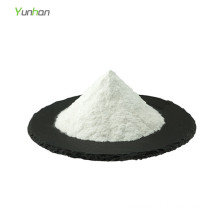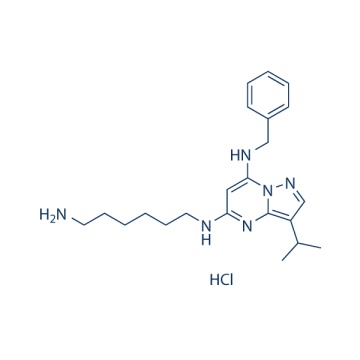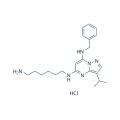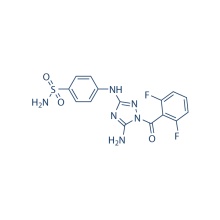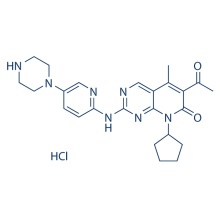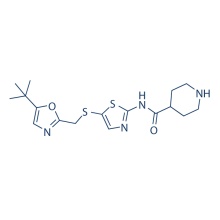BS-181 HCl 1397219-81-6
Product Description
.cp_wz table {border-top: 1px solid #ccc;border-left:1px solid #ccc; } .cp_wz table td{border-right: 1px solid #ccc; border-bottom: 1px solid #ccc; padding: 5px 0px 0px 5px;} .cp_wz table th {border-right: 1px solid #ccc;border-bottom: 1px solid #ccc; padding: 5px 0px 0px 5px;}
Molecular Weight:
416.99 BS-181 HCl is a highly selective CDK7 inhibitor with IC50 of 21 nM. It is more than 40-fold selective for CDK7 than CDK1, 2, 4, 5, 6, or 9.
Biological Activity
BS-181 is a small molecule inhibitor of CDK7 in a cell-free environment,
which displays more potential activity than roscovitine with IC 50 of
510 nM. Among the CDKs and other 69 kinases from many different classes,
BS-181 shows high inhibitory selectivity for CDK7, inhibits CDK2 at
concentrations lower than 1 μM which being inhibited 35-fold less
potently (IC50 with 880 nM) than CDK7, shows slight inhibition for CDK1,
CDK4, CDK5, CDK6 and CDK9 with IC50 values higher than 3.0 μM, and only
shows inhibition for several kinases from Other classes at high
concentrations (>10 μM). BS-181 promotes Cell Cycle arrest and
inhibits the cancer cell growth of a range of tumor types, including
breast, lung, prostate and colorectal cancer with IC50 in the range of
11.5-37 μM. In MCF-7 cells, BS-181 inhibits the phosphorylation of the
CDK7 substrate RNA polymerase II COOH-terminal domain (CTD), and
promotes cell cycle arrest and Apoptosis to inhibit the growth of cancer
cell lines.
BS-181 is stable in vivo with a plasma elimination half-life in mice of
405 minutes after i.p. administration of 10 mg/kg. BS-181 inhibits the
growth of MCF-7 xenografts in the nude mice model in a dose-dependent
manner, with 25% and 50% reduction in tumor growth after 2 weeks of
treatment at 10 mg/kg/day and 20 mg/kg/day, respectively without
apparent toxicity.
Protocol(Only for Reference)
Kinase Assay: [1]
Cell Assay: [1]
Animal Study: [1]
Conversion of different model animals based on BSA (Value based on data from FDA Draft Guidelines)
For example, to modify the dose of resveratrol used for a mouse (22.4 mg/kg) to a dose based on the BSA for a rat, multiply 22.4 mg/kg by the Km factor for a mouse and then divide by the Km factor for a rat. This calculation results in a rat equivalent dose for resveratrol of 11.2 mg/kg.
Chemical Information
Molarity Calculator
Dilution Calculator
Molecular Weight Calculator
Contact us if you need more details on 1397219-81-6. We are ready to answer your questions on packaging, logistics, certification or any other aspects about BS-181 HCl 1397219-81-6、1397219-81-6 BS-181 HCl. If these products fail to match your need, please contact us and we would like to provide relevant information.
Molecular Weight:
416.99 BS-181 HCl is a highly selective CDK7 inhibitor with IC50 of 21 nM. It is more than 40-fold selective for CDK7 than CDK1, 2, 4, 5, 6, or 9.
Biological Activity
BS-181 is a small molecule inhibitor of CDK7 in a cell-free environment,
which displays more potential activity than roscovitine with IC 50 of
510 nM. Among the CDKs and other 69 kinases from many different classes,
BS-181 shows high inhibitory selectivity for CDK7, inhibits CDK2 at
concentrations lower than 1 μM which being inhibited 35-fold less
potently (IC50 with 880 nM) than CDK7, shows slight inhibition for CDK1,
CDK4, CDK5, CDK6 and CDK9 with IC50 values higher than 3.0 μM, and only
shows inhibition for several kinases from Other classes at high
concentrations (>10 μM). BS-181 promotes Cell Cycle arrest and
inhibits the cancer cell growth of a range of tumor types, including
breast, lung, prostate and colorectal cancer with IC50 in the range of
11.5-37 μM. In MCF-7 cells, BS-181 inhibits the phosphorylation of the
CDK7 substrate RNA polymerase II COOH-terminal domain (CTD), and
promotes cell cycle arrest and Apoptosis to inhibit the growth of cancer
cell lines.
BS-181 is stable in vivo with a plasma elimination half-life in mice of
405 minutes after i.p. administration of 10 mg/kg. BS-181 inhibits the
growth of MCF-7 xenografts in the nude mice model in a dose-dependent
manner, with 25% and 50% reduction in tumor growth after 2 weeks of
treatment at 10 mg/kg/day and 20 mg/kg/day, respectively without
apparent toxicity.
Protocol(Only for Reference)
Kinase Assay: [1]
| In vitro kinase inhibition. | Inhibition of CDK7 activity is measured by incubation of increasing amounts of BS-181 with purified recombinant CDK7/CycH/MAT1 complex, followed by measurement of free ATP remaining in the reaction using a luciferase assay, luciferase activity therefore providing a measure of inhibition of CDK7 activity for the determination of IC50. |
|---|
Cell Assay: [1]
| Cell lines | MCF-7 cells |
|---|---|
| Concentrations | Dissolved in DMSO, final concentration ~50 μM |
| Incubation Time | 24 hours |
| Method | MCF-7 cells are exposed to BS-181 for 24 hours. For the determination of cell cycle and apoptosis, cells are stained with propidium iodide or labeled with Annexin V-FITC, then labeled cells are acquired within 1 hour, by using the RXP cytomics software on a Beckman Coulter Elite ESP, and the data are analyzed using Flow Jo v7.2.5. For the assessment of CDKs, cells are lysed and analyzed by western blotting. |
Animal Study: [1]
| Animal Models | MCF-7 cells are established in female nu/nu-BALB/c athymic nude mice | ||
|---|---|---|---|
| Formulation | Prepared in the vehicle of 10% DMSO / 50 mM HCl / 5% Tween 20 / 85% saline. | ||
| Dosages | 10 or 20 mg/kg | ||
| Administration | Twice daily by i.p. injection | ||
| Solubility | 1% DMSO/30% polyethylene glycol/1% Tween 80, 30 mg/mL | ||
| * Please note that Selleck tests the solubility of all compounds in-house, and the actual solubility may differ slightly from published values. This is normal and is due to slight batch-to-batch variations. | |||
Conversion of different model animals based on BSA (Value based on data from FDA Draft Guidelines)
| Species | Baboon | Dog | Monkey | Rabbit | Guinea pig | Rat | Hamster | Mouse |
| Weight (kg) | 12 | 10 | 3 | 1.8 | 0.4 | 0.15 | 0.08 | 0.02 |
| Body Surface Area (m2) | 0.6 | 0.5 | 0.24 | 0.15 | 0.05 | 0.025 | 0.02 | 0.007 |
| Km factor | 20 | 20 | 12 | 12 | 8 | 6 | 5 | 3 |
| Animal A (mg/kg) = Animal B (mg/kg) multiplied by | Animal B Km |
| Animal A Km |
For example, to modify the dose of resveratrol used for a mouse (22.4 mg/kg) to a dose based on the BSA for a rat, multiply 22.4 mg/kg by the Km factor for a mouse and then divide by the Km factor for a rat. This calculation results in a rat equivalent dose for resveratrol of 11.2 mg/kg.
| Rat dose (mg/kg) = mouse dose (22.4 mg/kg) × | mouse Km(3) | = 11.2 mg/kg |
| rat Km(6) |
Chemical Information
| Molecular Weight (MW) | 416.99 |
|---|---|
| Formula | C22H32N6.HCl |
| CAS No. | 1397219-81-6 |
| Storage | 3 years -20℃Powder |
|---|---|
| 6 months-80℃in solvent (DMSO, water, etc.) | |
| Synonyms | |
| Solubility (25°C) * | In vitro | DMSO | 83 mg/mL (199.04 mM) |
|---|---|---|---|
| Water | 3 mg/mL (7.19 mM) | ||
| Ethanol | 27 mg/mL (64.74 mM) | ||
| In vivo | 1% DMSO/30% polyethylene glycol/1% Tween 80 | 30 mg/mL | |
| * <1 mg/ml means slightly soluble or insoluble. * Please note that Selleck tests the solubility of all compounds in-house, and the actual solubility may differ slightly from published values. This is normal and is due to slight batch-to-batch variations. | |||
| Chemical Name | N5-(6-aminohexyl)-N7-benzyl-3-isopropylpyrazolo[1,5-a]pyrimidine-5,7-diamine hydrochloride |
|---|
Molarity Calculator
Dilution Calculator
Molecular Weight Calculator
Contact us if you need more details on 1397219-81-6. We are ready to answer your questions on packaging, logistics, certification or any other aspects about BS-181 HCl 1397219-81-6、1397219-81-6 BS-181 HCl. If these products fail to match your need, please contact us and we would like to provide relevant information.
Product Categories : Cell Cycle > CDK Inhibitor
Other Products
Hot Products
Astragaloside AChlortetracycline HCl 64-72-2Paclitaxel 33069-62-4Dexamethasone Acetate 1177-87-3Dinaciclib (SCH727965) 779353-01-4CHIR-124 405168-58-3Ro3280 1062243-51-9TAME 901-47-3CCG-1423 285986-88-110058-F4 403811-55-2Dabigatran (BIBR 953) 211914-51-1H 89 2HCl 130964-39-5T0901317 293754-55-9Aprepitant 170729-80-3Turofexorate Isopropyl (XL335) 629664-81-9BMS-378806 357263-13-9








